Emily C.A. Snyder's Blog
May 1, 2018
Where Is Emily Blogging Now?
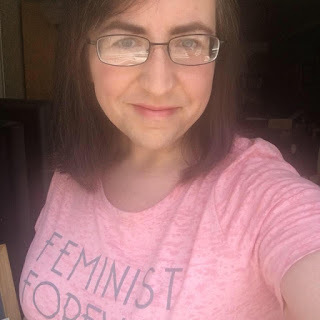
In case you missed it, I'm blogging over on Patheos now as the Pop Feminist! Taking on the intersection of art, faith, pop culture and feminism.
If you've enjoyed my articles here, make sure to subscribe to get all the latest updates!
See ya there,
 Emily
Emily
Published on May 01, 2018 15:37
March 27, 2018
TEATIME TEN: Jessica Grey
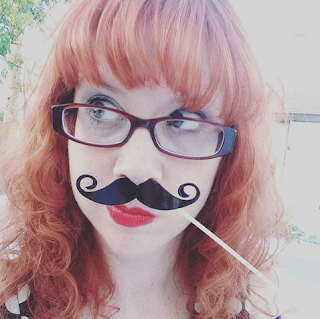 Welcome back to the Teatime Ten, an author interview series! Today we have the wonderful Jessica Grey, author of
Avowed
, and a whole host of other awesome books!
Welcome back to the Teatime Ten, an author interview series! Today we have the wonderful Jessica Grey, author of
Avowed
, and a whole host of other awesome books!BOOK GIVE AWAY! Comment to win one free copy of any of Jessica's novels! Make sure your email is associated with your user name, so that we can contact you.
1) Tell us a little bit about yourself since we last chatted!
Hi Emily and Emily's readers! Thank you so much for having me! The last we chatted was a looooong time ago. Since then some author friends and I have put out a six book series of holiday-themed Jane Austen novellas (each book contains an adaption of each of the six full Austen novels based around that particular holiday). This was a CRAZY, insane, ridiculous, exhausting, and fun project that took us two and a half years. Oh and a whole bunch of life stuff and not enough writing as also happened, but I think that's always the case.
2) What's your latest publication about?
My most recent publication is Avowed: A Companion Story to the Fairytale Trilogy. This is a 30k novella that's historical to my Fairytale series. It can be read alone(ish), but if you read the first two books of the Fairytale Series you will enjoy it more. Unlike my novels, it doesn't have the happiest of endings as it's about star-crossed lovers (Violet and Beorn who happen to be fae). I hate myself, truly.
3) What inspired you to write it?
Several readers asked me about Violet's and Beorn's history - their history is alluded to in Atone, the second book. I had a general outline of what happened to them in mind when I wrote Atone, but I wanted to explore it more fully. I think their story also compliments the upcoming third and final book in the series, Aspire: A Fairytale. We get to see a little bit of the conflict in the Fae Realm that is about to affect the modern day Human Realm in Aspire. I usually write a mix of modern world and fantasy and this was pretty straight up fantasy, so getting the change to work in a semi-new genre was enticing as well.
4) What was the hardest part of the book to write?
All of it. It was terrible. Several times I wondered why in the world I was breaking my own heart writing it. Actually, I wrote the end - the very last scene - first. Then I had to go backward and make not only the characters fall in love, but also make sure I could still be in love with both of them in spite of their sad end.
5) What's your favorite part of the writing process?
FINISHING. You cannot beat a finish. I also like that heady, high-on-a new-idea feeling you get at the start of the project...before the dark times, before reality sets in. And then the finishing. The middle part where they actual work takes place is usually a lot of tears and Starbucks and questioning why I do these things to myself.
6) What was your journey to publishing like?
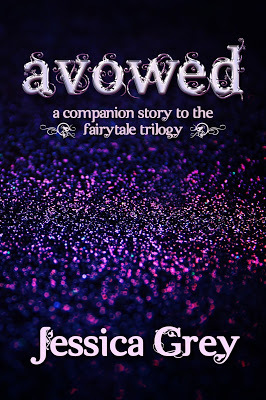 I didn't really have what I would consider a "journey" to publishing. I never really contemplated getting traditionally published. Almost nothing about it appealed to me, and there was a lot that didn't. Particularly having no control over my covers, that just boggled my mind - and still does!
I didn't really have what I would consider a "journey" to publishing. I never really contemplated getting traditionally published. Almost nothing about it appealed to me, and there was a lot that didn't. Particularly having no control over my covers, that just boggled my mind - and still does!I actually started a blog (now on permanent hiatus unless I find myself independently wealthy and the owner of a time turner) to support indie Jane Austen writers because I read a book called Charlotte Collins by Jennifer Becton and LOVED it. Jennifer was always super open and honest about self publishing and full of great tips (her site bectonliterary.com always has fantastic info) and I was encouraged by her journey to try self publishing.
Awake: A Fairytale was my first completed novel and I went ahead and published it. There's things I would change looking back...and things I'm glad I didn't know not to do cause they worked fine! I am a better writer and publisher now, but it's been an adventure so far.
(Side note: when putting together the Holidays with Jane collections I KNEW I wanted Jennifer Becton involved and for totally unknown reasons she said yes and her stories are amazeballs.)
7) Do you have any tips for would-be authors?
This is where I am supposed to say "Write! Write every day and perfect your craft!" I'm so not going to say it because I do not write anywhere near every day. I would say my number one tip for authors is to figure out what you want and why. WHY are you writing? WHY do you want to publish? And then go the heck after it. Everyone has different motivators. And honestly, sometimes our motivations change. Pick some reasons, put them up where you can see them - make a pretty little inspo board if that rings your bell, if it doesn't put a sticky note on your laptop - whatever works for you. And then go after those goals.
8) You wake up to find yourself in a fairy tale. Which one do you hope it is and what role are you playing?
I love fairy tales, but most of them are horrible beyond belief. I wouldn't want to be the lead in any single fairy tale that I can think of. I would, however, like to be a fairy godmother. But only for a limited run. Appearing this week only - Jess as Fairy Godmother. I can imagine that granting wishes to people would get tiring after a few days, especially they’re really stupid wishes and you can’t offer helpful life advice.
9) You find yourself with an entire day with the means and time to treat yo'self. What does your day look like?
I am going to Disneyland with all my frieeeeeends! This is not a joke, I would totally do this. And I would get all my friends dressed up and take pretty pictures at Disneyland with them all fancy-like, because I seriously wish I had lovely pictures of me and all my girls up on my walls. Then I would eat my way through the parks. Some food on my agenda: churros, Dole Whip, breakfast at the Main Street Cafe, kabobs at the Bengal BBQ, head on over to CA Adventure for soup in sourdough bowls...this is what I plan to eat before 11 am. We haven't even begun to discuss dinner which will be at the Blue Bayou and fantastic.
Stretchy pants will be required.
10) What's up next creatively for you?
Next up I am finishing and publishing Aspire, the last book The Fairytale Trilogy. Then I get to finish work on Sun, Moon, and Stars which is my take on the fairy tale "Allerleirauh or All Kinds of Fur." I’m super excited to get to work on it as it’s been hanging around in my head for years upon years.
 CONNECT WITH THE AUTHOR:
CONNECT WITH THE AUTHOR: Connect with Jessica on
Facebook, Twitter and Instagram. Check out her official website here.

 Want more Pop Feminism blogs? Become my patron on Patreon today! And follow my Pop Feminist blog on Patheos!
Want more Pop Feminism blogs? Become my patron on Patreon today! And follow my Pop Feminist blog on Patheos!
Published on March 27, 2018 08:23
March 13, 2018
TEATIME TEN: Jenny Lyn Bader
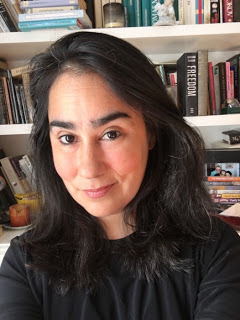 Welcome back to the Teatime Ten, an author interview series! Today we get to host the witty and prolific playwright Jenny Lyn Bader, whose work has been featured by Turn to Flesh Productions, and whose latest venture brings performance...right into your ear! Check it out!
Welcome back to the Teatime Ten, an author interview series! Today we get to host the witty and prolific playwright Jenny Lyn Bader, whose work has been featured by Turn to Flesh Productions, and whose latest venture brings performance...right into your ear! Check it out!
1) Do you have any plays running in New York right now that we can see?
Oddly enough, I have one running that you can hear. It’s a “phoneplay” called The International Local on the app Subway Plays. It’s designed to be listened to on the 7 train between Times Square and Jackson Heights. The whole thing, roundtrip, runs about an hour. The app also includes plays by two other playwrights, Jessie Bear and Colin Waitt, set respectively on the N and the L lines. It’s self-scheduled, so you don’t have to make a certain curtain time, and “intermission” can take as long as you want.
2) If it’s on an app, I can also just listen to it at home, right?
Of course after you’ve downloaded the app you can listen anywhere, but to get the full sensory and site-specific experience, you probably want to be on the appropriate train line.
3) Writing a “phoneplay” must present some unique challenges… What was the hardest part?
The director, Erin Mee, asked me to make the play reversible, so people could listen to one act on their trip from Manhattan to Queens, and then hear the second act coming back – but those with the reverse route could listen to it in the opposite order. That was a tough problem to solve. I turned to dramatic literature for answers but found none. Historically there have been dramatic structures where scenes could be scrambled into different orders, or where stories went in reverse, but nothing notable where two halves of a play could just “flip.” So I had to play with time a little.
4) What's your favorite part of the writing process?
When it feels like words are writing themselves.
5) What was your journey to publishing/production like?
Like driving a sputtering bicycle through a field of land mines.
6) Do you have any tips for would-be authors?
Make sure you have air in the bicycle tires before setting off.
7) Any tips for playwrights?
Read your play out loud and play all the roles. When I was at the O’Neill Center they had the playwrights do that at the beginning of the development process, in front of a roomful of theatre professionals. But you can do it anywhere, in front of anyone. And it’s illuminating.
8) You've been granted the ability to solve all the world's problems, but you must do so in one word. What's the magic word? And why?
Listen. Without listening, human beings can develop completely deranged views of one another. So many have lost the capacity to do it. And it is so desperately needed.
9) A line of dialogue you wrote today is now the title of your memoir. Justify.
"With the technology we have, spontaneity can be scheduled!" Of course that whole line would make a terrible title but I can see the phrase “scheduled spontaneity” being included in a longer one—e.g., Paradoxes: A memoir of intuitive logic, scheduled spontaneity, and conscious subconscious moments. Because I love it when opposites turn out not to be so opposite after all.
10) What's up next for you?
My short piece about Hannah Arendt, Mrs. Stern Wanders the Prussian State Library, will be performed at the Museum of Jewish Heritage on the morning of Wednesday, March 21st in the festival Untold Stories of Jewish Women . I’m in the early research phase of a new project with This is Not a Theatre Company, this one set at a certain New York City landmark. And of course I’m always finishing all the scripts I’ve started… and re-starting the ones I finished.
 CONNECT WITH THE AUTHOR:
CONNECT WITH THE AUTHOR: Connect with Jenny Lyn on Twitter or Instagram. Stay up to date on her official website here. Find Out How to Get Subway Plays here.

 Want more? Become my patron on Patreon today! And join me on my new blog, the Pop Feminist!
Want more? Become my patron on Patreon today! And join me on my new blog, the Pop Feminist!
Published on March 13, 2018 23:20
March 6, 2018
TEATIME TEN: Laura Pittenger
Welcome back to the Teatime Ten, an author interview series! Today we have the wonderful Laura Pittenger, playwright and novelist, author of Pride and Prejudiced Abridged .

1) Tell us a little bit about yourself!I'm a playwright, director, and a serious, committed goofball. I was born and raised in Indiana and moved to New York in 2012 after graduating from Ball State with a theater degree. You can check out www.laurapittenger.comfor the full skinny! In my free time I like to read Russian novels, watch British baking television and explore the city with good friends. I also like to travel - past favorites include Alaska, Montreal, London, Boston, Acadia National Park, and the Badlands.
2) What's your latest publication about?
Pride and Prejudice Abridged, now available at YouthPLAYS. Synopsis (which most people probably know already!): Witty and carefree Elizabeth Bennet despises the haughty Mr. Darcy—a wealthy, proud newcomer to her small English village. Her sister Jane Bennet, so shy she becomes mute around men, falls for Darcy’s best friend, the wildly outgoing Mr. Bingley. Will the Bennet sisters’ scheming mother be spurned in her efforts to ensnare rich husbands for her daughters? Who will Elizabeth fall for: her weaselly preacher cousin, the smooth and seductive Mr. Wickham, or maybe even her worst enemy—Mr. Darcy? We don’t have all day to find out! Bonnets fly. Cravats are loosened. You don't want to miss it.
3) What inspired you to write it?I took a course on Jane Austen's major works in the honors college, and we were asked to do a short creative project at the end of the term. Pride and Prejudice Abridged was a natural bridge between my love for literature and theater, and who knew a school project would one day end up published?!
4) What was the hardest part of the book to write?Definitely cutting the text down to 15 minutes is one of the hardest adaptation challenges I've ever had. It's a huge book, but believe it or not, you can cut out characters and plotlines to the bare essentials, which I have done. Anything you read there, it exists because the story falls apart without it. It's as basic as the story can get without me adding anything, besides a few very silly jokes.
5) What's your favorite part of the writing process?
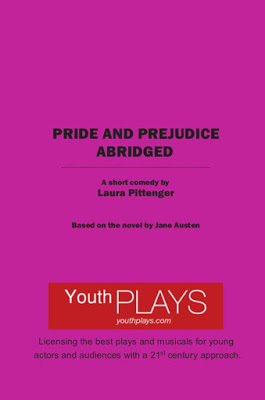 I love that moment when the energy is flowing and the text is just swimming along magically. It's hard to put into words, but it's like time stops existing. Before you know it it's bedtime. I also love handing it off to a close friend and hearing where they laugh. I love making people laugh.
I love that moment when the energy is flowing and the text is just swimming along magically. It's hard to put into words, but it's like time stops existing. Before you know it it's bedtime. I also love handing it off to a close friend and hearing where they laugh. I love making people laugh.6) What was your journey to publishing like?
I had a couple people tell me how hilarious the piece was, and my colleague suggested I submit the piece to YouthPLAYS, thinking it might be a good fit for a youth market (middle-high school or college). After a few months, they got in touch and said they'd be happy to publish it as a standalone piece! It's my first published play in its own binding, so I couldn't be happier.
7) Do you have any tips for would-be authors?
Even if an idea seems silly, if it made you laugh, try it out. Feel free to fail in the privacy of your own computer or notebook. Odds are someone else finds you funny, too. Also, I write almost exclusively for myself. I'm happy that other people seem to respond to it, and I take outside feedback very seriously, but at the end of the day, if I don't like it, I won't work on it. I write things I wish someone else would write for me.
8) You're walking through Central Park, when suddenly you hear your name being called. It's a very famous composer who invites you to join his/her tea for an hour. Who are you talking to and what do you talk about?
Oh, man, that's a rough question. I would want to spend an hour with Mozart, who hopefully speaks English in this scenario. I say that because I have the feeling that I might actually cross paths with Lin Manuel Miranda or Dave Malloy one day and therefore I don't want to waste this hypothetical conversation on someone alive and living in my city. Anyway - I'd ask him if he ever saw the movie Amadeus and whether there was any accuracy to the rumors about Salieri. I have so many questions. I'd also ask him what goes through his head as he's writing and what he dreams about. He'd probably find the line of questioning a bit invasive, though, so I'd be happy to sit in silence, too. As long as the tea is good. That's probably a motto for my life. Will try anything as long as the tea is good.
9) You're woken up in the middle of the night by one of your characters calling you through a magic door. Who are you adventuring with and where do you go? And how do you get back?
I'd let the little heroine of my novel, Aleksandra, take me to her Moscow in 1872. There's so much I don't know about it. But she'd probably insist we go somewhere exciting like Paris or St. Petersburg. I'd be happy to accompany her by rail across Europe. Maybe we would encounter my other favorite fictional protagonist, the elusive Phileas Fogg, as he traveled round the world in 80 days going the opposite direction.
10) What's up next creatively for you?
Speaking of the novel...yep. I also have a full length play written that I'm looking to stage or get a reading done. Lots of writing projects right now, none that I can talk about. If you want to hear more I also just did an interview for Art Chat inWestchester!
 CONNECT WITH THE AUTHOR:
CONNECT WITH THE AUTHOR: Connect with Laura on Facebook, Twitter and Instagram. Check out her official website here.

 Want more Pop Feminism blogs? Become my patron on Patreon today!
Want more Pop Feminism blogs? Become my patron on Patreon today!
Published on March 06, 2018 13:49
March 4, 2018
Art and the Artist: Can We Like Anything After #MeToo?
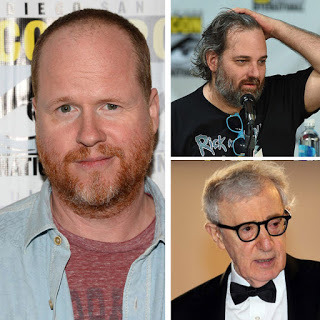 (L) Joss Whedon, creator of Buffy the Vampire Slayer
(L) Joss Whedon, creator of Buffy the Vampire Slayer(TR) Dan Harmon, creator of Community(BR) Woody Allen, filmmaker, auteurEarly last year, before #MeToo broke, I woke up one day to see a distressing headline about one of my favorite artists, the self-proclaimed feminist and creator of Buffy the Vampire Slayer, Joss Whedon. In an open letter, his wife Kai Cole shared the painful details of their split, including his admission of multiple counts of both emotional and sexual infidelity throughout their marriage.
As Cole shares from Whedon's farewell letter to her:
"When I was running ‘Buffy,’" [Whedon writes], "I was surrounded by beautiful, needy, aggressive young women. It felt like I had a disease, like something from a Greek myth. Suddenly I am a powerful producer and the world is laid out at my feet...I let myself love you. I stopped worrying about the contradiction. As a guilty man I knew the only way to hide was to act as though I were righteous. And as a husband, I wanted to be with you like we had been. I lived two lives."While I was puzzling out my emotional reaction to this news, I was in the middle of a Season 7 Buffy rewatch. Suddenly, almost every episode rang like a confession: especially scenes that I knew Joss had written or touched up.
The one-two punch of the first two S7 episodes, "Lessons" and "Beneath You," show just this dichotomy in action. Whereas "Lessons" concludes with what might be the predator's mantra: "It's not about right. It's not about wrong. It's about power," the following episode, "Beneath You," ends with a remarkable Whedon-penned scene that rambles between laying the blame of sexual assault and accompanying guilt on God, on the soul, on the object of affection and finally concluding with the image of the vampire burning while embracing the cross and asking: "Can't we all just rest now, Buffy?"
The answer, of course, is no, no - there is no resting in this valley of tears. And if you want to make amends, you have to do the work. Joss Whedon's letter to his wife felt like Spike's rambling soliloquy in "Beneath You:" Joss had screwed up, Joss had admitted as much - wasn't being found out punishment enough? Can't we all just rest now?
The Artist, The Art & The Audience
As powerful men have fallen these past few months, one of the questions that has resonated is whether we're allowed to like any of the art they created. In one camp, we have the argument that the art is not the artist, and so we are free to enjoy the art and let the law deal with the man. However, others feel - particularly when it comes to artists whose misconduct has been egregious (Cosby, Polanski, etc.) - that it is morally unethical to support any of their body of work, even in retrospect.
I would argue that no matter which camp you fall into, the questions we are actually trying to unravel are:
What degree of the creator's moral (or immoral) DNA is entwined with the art itself; andWhat in the art are we, the audience, responding to...and is that worth preserving?Influencing the Art
Different disciplines of art will naturally include more or less of the artist's DNA in it. A novel, piece of fine art, or musical composition will arise largely from a single source, while the performative arts, such as theatre, TV and film are collaborative by nature.
Thus, while Joss Whedon was the creative force behind Buffy the Vampire Slayer, there was a whole host of other writers, producers, directors, and actors' input to help shape each season. Joss' fingerprint is evident, but is not all. For example, it's known that Marti Noxon took over as show runner for seasons six and seven of the show, while Joss was focused on developing Firefly.
The collaborative nature - and thus distancing or mitigating effect of one particular artist's influence on a project - is even more evident, for example, in Harvey Weinstein-produced Miramax films. Largely the role of producer is as gatekeeper, not artistic auteur. Hence, for a Miramax film such as Jane Austen's Emma, very little of Weinstein's personal predations will be immediately evident.
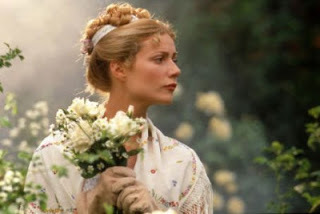
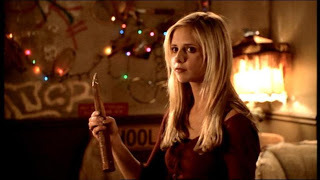 No obvious influence, except, of course, for telling every 90's girl that she better be blonde and teeny to be worth anything.
No obvious influence, except, of course, for telling every 90's girl that she better be blonde and teeny to be worth anything.The Auteur Effect
In the cases of highly collaborative art, then, it may be easier to still enjoy the art itself, while still being critical of any downfalls.
But what about auteurs? In these cases, the director is also the writer is also, often, the producer, beholden to no one but his own vision. Comedians fall into this category, which is why revelations about Bill Cosby and Louis CK can come as such a shock. In some ways, at least Louis CK was always upfront about his downfalls: much of his stand-up centered around masturbation. Are we then surprised to discover he was telling the truth? Bill Cosby's legacy is more pernicious: where was the evidence of the monster in the wholesome Cosby Show, or in any of his comedy routines? The fact that he could be a "smiling, smiling damned villain" hurts.
For many, myself included, the overt, grossly sexualized material of Louis CK turned me off to his work before details about his personal life and sexual misconduct came out. The loss of his comedy didn't affect me. However, I find that the duplicity of Bill Cosby's conduct, as well as the horrific allegations of drugging and raping women, disgust me on such a personal level that I've even excised any reference to his stand up comedy from my conversation. Others might have a different reaction: capable of still enjoying either comedian's work, safe in the knowledge that both men are undergoing punishment for their sexual misconduct and assault.
But what, then, are we to do with the predators still at large? Who are still profiting from our dollars, while flaunting their criminal fetishes on the screen? Which is to say:
What About Woody?
Although Woody Allen has never been officially condemned by a court of law, the auteur has repeatedly and consistently been accused of molesting his own daughter, Dylan Farrow, when she was aged seven (content warning: video). Further exploration into Allen's personal journals and movie notes, housed at the University of Princeton, reveals a man who unequivocally fetishizes sexual interactions with underage women (content warning: article). Add onto this his public affair, and eventual marriage to adopted daughter, Soon-Yi Previn, and we have a pretty good idea of the man himself.
But does this same predatory predilection show up in Allen's artwork? Well, yes. Yes, it does. From Manhattan (video above) through to his banal current material, such as To Rome, With Love (video below), we see this same fetishizing, either starring Allen directly or through one of his many on-screen doppelgängers. Which is to say:
We don't have to look for the man behind the curtain. He's getting away with it, and grinning in our face.
So much for answering our first question: how much of Woody Allen's moral DNA is mixed up with much of his work? The answer: quite a bit. His films celebrates his fetish, and even makes excuses for it, vindicating his behavior.
Since, famously, Allen has been working outside the traditional film industry - writing, directing, and producing his own work (Allen releases one new film a year), the content of his stories reflects his single point of view, unmitigated by producers or financeers.
What is more, since Allen largely finances his films through ticket sales and residuals from his extensive body of work, his success is the result of our literally buying what he's selling. Which begs the question: just what are we buying?The Active Audience
Hamlet famously says that the purpose of art is to "hold, as 'twere, the mirror up to nature." That is, the purpose of art is to help us look inside our own souls. We are not merely passive consumers of art, hypnotized by glowing screens. In many ways art is completed by the audience. The Marquis de Sade's novel harms none but himself until someone else reads it. Even the Bible is just a paperweight unless it's opened up. However, one man may read the Marquis of Sade and be so disgusted that he turns to God; while we have ample evidence of people reading the Bible and putting it back unconvinced.
Which is to say: the art and even the artist themselves are only two parts of the equation. The third part is our own response to the art itself.
So, when we ask the question whether we can enjoy a piece of art anymore - particularly when we learn that the art was borne of a predatory artist - we are actually reevaluating our own part in the art itself. We are reevaluating our relationship to both the art and the artist. We are reevaluating our worldview to the world. We are criticizing the art, rather than just consuming it.
Witness David Klion's excellent article at Jewish Currents, examining his own formation in "Unlearning Woody Allen." For Klion, the nebbish hero who talks down to women and thereby gains both the girl and a smug feeling of superiority is part of what he cherished about Allen's films. As Klion writes:
"Renouncing Woody Allen is painful for many of us not just because we enjoy his work, but because it feels like renouncing a part of ourselves. It also feels cheap, because there’s no point in renouncing him if we can’t also renounce the part of us that finds his characters relatable. We need to take a closer look at the films that taught us to be this way, and to consider what else they taught us."Such critical thinking may lessen the pure enjoyment of a piece of art for a time, but may preserve the importance of the art as well. After all, what's that about those who do not study their history being doomed to repeat it? It's not enough that we wake up, culturally; it's equally important to shine a light on our darkness, rather than burying it further.
Money, Money
That does not mean, however, that we necessarily need to finance more of Woody Allen's work, or any other known or suspected abuser. Some have suggested that all the royalties from Woody Allen's films should be rerouted to his victims, which sounds noble in theory but is dangerous in practice. If Woody Allen's pockets are lined, it's because we lined them. We liked something in his work, resonated for good or ill, and his success is because of our support. It's important to own that fact.
You get the art you pay for.Copyright law is copyright law. Intellectual property, even if that intellect is questionable, is still the property of the individual. However, should Allen or any other abuser come into a court of law, it would be perfectly fine to order them to pay a certain amount to their victims as partial reparation - payments which would likely be culled from those same royalties.
However, I believe that when we wish a certain artist's profits to be given to someone other than the artist, what we're really looking for is a way to exonerate our own part in the artist's success. If I know that I can see Allen's new film, and that my $15 won't go to line his pocket, perhaps I can enjoy the film without my conscience bothering me. But that simply isn't the case. As audience members we have to take responsibility for what we seek out and why; who we pay and whether we really want to consume what they're feeding us.
The Penitent Artist
In a rare turn, there has been at least one creator who - rather than cowardly ducking out of his marriage like Whedon, or glorying in his atrocities such as Allen - has actually confessed and apologized for his own actions. This past January, writer Megan Ganz acccused Dan Harmon, the creator of the cult TV show, Community, of unwanted advances during their time working together.
In a pattern we've seen repeated among men with power, Harmon developed an unwelcome crush on one of his staff writers, Ganz. When she continued to refuse him, chiding him for treating her differently, he began to punish her instead, ultimately leading to some psychological trauma for the writer. In a public Twitter exchange this past January, Ganz called out Harmon to come clean about his own part, which he did in a lengthy apology on his podcast.
In a remarkable turn, Harmon specifically details every mistake he made, every poor decision, every terrible act. He shines a light on his own darkness, and even offers this light to his listeners, concluding:
I want you to be the one to examine this and every step of the way decide for yourself where I’m making mistakes. I don’t want to explain to you what I’ve learned. I want you to look at this and I want it to sound relatively unremarkable to you, because that’s the danger...
I lied to myself the entire time about it. And I lost my job. I ruined my show. I betrayed the audience. I destroyed everything and I damaged her internal compass. And I moved on....
I did it by not thinking about it and I got away with it by not thinking about it. And if she hadn’t mentioned something on Twitter, I would have continued to not have to not think about it...
Because if you don’t think about it, you’re going to get away with not thinking about it and you can cause a lot of damage that is technically legal and hurts everybody.That's Entertainment
So, can we enjoy anything now? Yes, of course we can. Although we may have to learn to enjoy things while also still thinking critically.
And we can even hope and pray for the artists who make work that troubles us, because while Woody Allen believes that "everything gets corrupted," it's also possible that - to paraphrase Dr. Who - this time, just this once, everybody gets saved. However, it'll take more than a few nice words; more than slumping passively on a crucifix, asking if we can all rest now. It's going to take picking up that cross -
And walking.
Published on March 04, 2018 22:48
March 1, 2018
TEATIME TEN: Teresa Edgerton
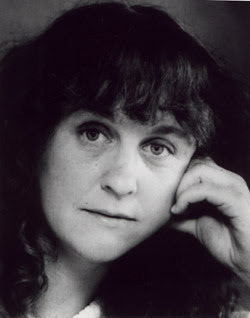 Welcome back to the Teatime Ten, an author interview series! Today we have the wonderful Teresa Edgerton, author of many, many, wonderful fantasy novels, including the recently re-released swashbuckling fantasy, the
Mask and Dagger Duology
.
Welcome back to the Teatime Ten, an author interview series! Today we have the wonderful Teresa Edgerton, author of many, many, wonderful fantasy novels, including the recently re-released swashbuckling fantasy, the
Mask and Dagger Duology
.1) Tell us a little bit about yourself!
I’ve been making up stories as far back as I can remember. It seemed like the natural thing to do. My parents told me stories, as well as reading to me a lot. Once I was able to read myself, I seemed to veer toward the fantastic early. Although I went through periods where I loved mystery stories, or historical novels, or romance, I always came back to fantasy eventually. Aside from reading and writing, I love Christmas, Halloween, and tea parties. I used to be rather craft-y, but of late my life has been pretty much consumed by writing and by freelance editing.
2) What's your latest book about?
My most recently published books are the re-issues of Goblin Moon and Hobgoblin Night (aka The Gnome’s Engine), swashbuckling fantasies in a baroque world inhabited by some of the usual fantasy races, but time has moved on and they’re all considerably more cosmopolitan then their medieval counterparts It’s a world of secret societies, dastardly plots, alchemy, magic, bizarre sciences, and … I feel I would be remiss if I failed to mention it . . . impeccable manners.
My work in progress is the third book in The Rune of Unmaking series. It’s epic fantasy, set in a world that has been at war for dozens of years—for some of the characters it has been more than their entire lifetimes, by a good bit. There is a large cast of main characters who have all been through a lot, and in this book they go through even more intense experiences. On a more personal level, the romance between two of the characters that I know readers have been hoping to see progress, does progress, but everything else gets a lot harder for them, too. For Sindérian it’s a time of transformation; she can never again be the woman she was before, and that’s hard for her to accept, but maybe she can be something greater. Prince Ruan has so many of his certainties called into question, and he’s not the kind of person who is accustomed to doubting himself. The other characters all face wrenching decisions, too. 3) What inspired you to write it?
Honestly? I had made up my mind that I probably wouldn’t be writing any more medieval type fantasy. (In fact, I have a detailed outline for a sequel to The Queen’s Necklace, set in a period roughly similar to the French Revolution, which I am determined to come back to eventually.) But then the first movie in the Lord of the Rings trilogy came out and I was swept back, emotionally, imaginatively, into that earlier type of setting, and so the Rune of Unmaking books were born. I had also wanted, for some time, to write a book where one of the themes was redemption, and some of the ideas from that one worked their way, subconsciously at first, into this one.
4) What was the hardest part of the book to write?
I’m at that point now. The series was originally going to be a trilogy, but after I was about halfway through this book and still had so much left to write, I realized that what I had on my hands was two books not just one. So I am trying to sort out the different story strands, so that all my main characters have an approximately equal role in both books, and that’s a bit difficult. I know it can be done, though, and I’m determined.
5) What's your favorite part of the writing process?
I love all of it. Creating the characters, discovering the twists and turns of the plot, the world building. I love using words to paint vivid images. The best part is when I am in the zone and it all flows out so easily, as though someone else is telling me the story and I’m just writing it down. But that can happen at any stage, and when I’m working on any part of the story. Or, equally often, working on any aspect of the writing, not happen, unfortunately.
6) What was your journey to publishing like?
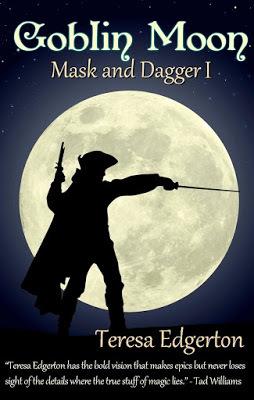 All through my childhood, teens, and twenties I was starting stories and not finishing them. Then about the time I turned thirty I had a dream which turned into a story that obsessed me, and I knew I was going to stick with it however long it took. As it happens, I had no idea how long that it would take, or how much effort it would involve, because really I knew very little about writing for all my earlier attempts. If I had known maybe that would have shaken me and I would have given up. But that’s when I got serious about learning, and when I feel that I really started writing. Six or seven years later, and I don’t even know how many drafts, my one book had turned into The Green LionTrilogy, and the first volume was good enough that I felt ready to send it out to publishers. Of course I was very nervous, but I just felt that that particular story had reached a point where it was as good as I was capable of making it. So I sent it out to a publisher, and was rejected. Sent it out to another, and was accepted. Which sounds very easy, and very lucky (and certainly my timing was good because fantasy was extremely popular at the time) but where someone else might have worked on several different projects during those years I devoted myself solely to that one.
All through my childhood, teens, and twenties I was starting stories and not finishing them. Then about the time I turned thirty I had a dream which turned into a story that obsessed me, and I knew I was going to stick with it however long it took. As it happens, I had no idea how long that it would take, or how much effort it would involve, because really I knew very little about writing for all my earlier attempts. If I had known maybe that would have shaken me and I would have given up. But that’s when I got serious about learning, and when I feel that I really started writing. Six or seven years later, and I don’t even know how many drafts, my one book had turned into The Green LionTrilogy, and the first volume was good enough that I felt ready to send it out to publishers. Of course I was very nervous, but I just felt that that particular story had reached a point where it was as good as I was capable of making it. So I sent it out to a publisher, and was rejected. Sent it out to another, and was accepted. Which sounds very easy, and very lucky (and certainly my timing was good because fantasy was extremely popular at the time) but where someone else might have worked on several different projects during those years I devoted myself solely to that one.7) Do you have any tips for would-be authors?
It’s going to be a long road ahead, so do concentrate your efforts on stories that you really want to write, instead of trying to follow the market or writing short fiction because people tell you that’s the best way to begin or writing a novel because someone tells you that that is the best way to begin. It’s going to be a lot of work, and likely years will pass before you see any reward except the pleasure you take in what you are doing and in seeing the story unfold. Write the story you would most like to read if somebody else had written it. Beyond that, read. Read fiction, nonfiction, poetry, whatever interests you, but read, read, read voraciously. You can absorb so many lessons about writing that way, without even realizing it while you are learning them. And especially if you are writing fantasy, and creating imaginary worlds, it helps enormously the more you know about the ways in which the real world works.
8) You've been granted the ability for a five course dinner with one of your heroes...andone of your villains. Who's coming with you?
As to the hero I am a bit torn. On the one hand I’d like to invite Raith from The Queen’s Necklace, because there is still so much that I don’t know about him and I’d want to ask him a lot of questions. But then there is Francis Skelbrooke from Goblin Moon, because … well, he’s so dashing and romantic. It would be a bit shallow to pick on those grounds alone, wouldn’t it? So I guess I’ll choose Raith. For the villain, the Duchess from Goblin Moon. She’s a terrifically complex character, and though by our lights she can be evil at times there is also a great deal of good in her. It depends on which version of her would show up, but I assume she’d be on her good behavior over dinner, and at her most charming and entertaining. I assume I’m the hostess, so I wouldn’t have to worry about anything dangerous being slipped into the soup.
9) Your family has been given a month long vacation in up to three cities. Where are you all going and what will you see?
London, because I know John would want to visit all the museums, and I’m sure I’d find plenty to enjoy there myself. I’d want to see the Royal Ballet while I was there, and visit lots of bookstores. Venice and Prague because to me they both seem so magical. I think we’d both have a great time visiting little hidden streets and obscure little shops.
10) What's up next creatively for you?
After the current book, then on to the next to finish up the series. And after that is done, I hope the Queen’s Necklace sequel. In the meantime, as a side project I’m creating a deck of Tarot cards for Goblin Moon/Hobgoblin Night.
 CONNECT WITH THE AUTHOR:
CONNECT WITH THE AUTHOR: Connect with Teresa on Facebook and Goodreads. Check out her official website here, and you can purchase her books here!

 Want more Pop Feminism blogs? Become my patron on Patreon today!
Want more Pop Feminism blogs? Become my patron on Patreon today!
Published on March 01, 2018 08:19
February 20, 2018
TEATIME TEN: Zelda Knapp
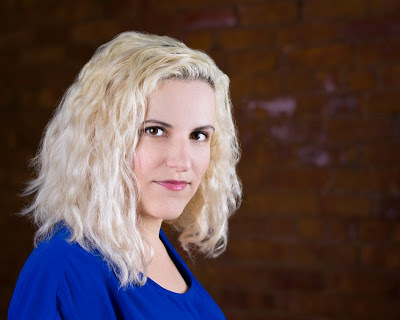 Welcome back to the Teatime Ten, an author interview series! Today we have the wonderful Zelda Knapp, author of
This Is What They Made It Out Of: tales from the end of the world
, theatre critic at A Work Unfinishing, and host of the Buffy and Veronica Mars rewatch, Once More With Extreme Prejudice.
Welcome back to the Teatime Ten, an author interview series! Today we have the wonderful Zelda Knapp, author of
This Is What They Made It Out Of: tales from the end of the world
, theatre critic at A Work Unfinishing, and host of the Buffy and Veronica Mars rewatch, Once More With Extreme Prejudice.BOOK GIVE AWAY! Comment to win one free copy of This Is What They Made It Out Of. Make sure to check back next week to see if you won!
1) Tell us a little bit about yourself!
At Derek Delgaudio's show, In & Of Itself, there's a wall of identity cards in the lobby, and each audience member is invited to select one. The range is expansive and whimsical, including things like Bookkeeper, Mother-in-Law, and Unicorn. I chose Storyteller. I love stories; I love telling a story, and I love being told one. Part of what I love about live theater is the infinite range of stories to be told, and the infinite ways to tell them. As a writer, my love of stories has manifested in an eclectic way - as a creator: short stories, poetry, and several plays; as an appreciator: a theater blog, a television blog with my friend Daniel, and lately I've been collaborating with my brilliant musicologist father on several articles about musical theater because we're both tremendous nerds.
2) What's your latest book about?
My book, This Is What They Made It Out Of: tales from the end of the world, is about everything, if you want to get pretentious, but really it's about small moments and their rippling effects. It's a collection of short (and shorter) fiction, with a daub of poetry, intended as the remnants of what we leave behind, when we leave for good. They're unconnected but the intention is that, taken as a collection, they create a tapestry of memories and personalities. So I've got missed connections, relationships and the detritus they leave, and what the survivors make of the pieces left behind. It's not all as dour as that sounds (I'm rather fond of the adventures of the ill-fated band, Soul Kiss, and of what I imagine happens to the Dellacroft Children), and I like to believe in hope and happy endings, but there's definitely a melancholy thread throughout the collection.
3) What was the hardest part of the book to write?
I have a tendency, in the eleventh hour, to start questioning everything about what I've done. While this has served me well in the articles with my dad (catching errors, strengthening arguments), in the case of getting TIWTMIOO, it led only to more stress. I filled to the brim with self-doubt about the book's title and asked my cover designer to show me the three cover contenders with two different titles, before I finally returned to my original. I'm still happy with it.
Oh, well, also. There's the writing. With a collection, it's not one long story, but you still want all the pieces to feel like they belong together. Part of constructing that jigsaw is finding missing pieces and brooding over how to fill them. That's been the biggest challenge with my second, not-yet-in-existence book. It's still missing a few limbs. And possibly its liver.
4) What's your favorite part of the writing process?
My fiction pieces usually start with an image or a moment, and ripple out from there. My favorite part is when I realize what to do with the starting point, where to go next. I have so many abandoned images, but the moment of clarity when I see what the possibilities are, and then when I go there - that's a good moment.
I also like landing on the exact right way to express an idea or image - which sometimes won't show up til the tenth or twelfth or twenty-fifth draft. This happened quite recently with one of the articles with my dad. Neither of us were happy with a particular piece of phrasing. The connotations weren't right, the diction of it wasn't pleasing. Finally we realized it was the verb that was off, not the adverb, and now it's perfect. PERFECT, I TELL YOU.
5) What was your journey to publishing like?
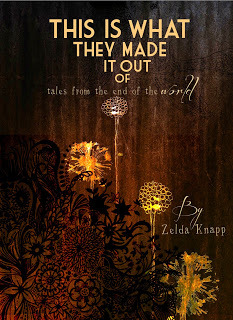 I'd tried the traditional route, submitting stories to magazines and journals, but hadn't had much luck. Then I saw that a writer I knew and admired from the Buffy fanworld, Valerie Z. Lewis (her fanfics were ridiculous and perfect), had independently published her longer works as ebooks. And I realized it was as easy as that. Digital publishing opened the door, like iTunes or YouTube did for other media, for the written word to get out there at little to no cost to the creator. That's when I decided I could do that, too, and began assembling my pieces into a coherent shape.
I'd tried the traditional route, submitting stories to magazines and journals, but hadn't had much luck. Then I saw that a writer I knew and admired from the Buffy fanworld, Valerie Z. Lewis (her fanfics were ridiculous and perfect), had independently published her longer works as ebooks. And I realized it was as easy as that. Digital publishing opened the door, like iTunes or YouTube did for other media, for the written word to get out there at little to no cost to the creator. That's when I decided I could do that, too, and began assembling my pieces into a coherent shape.After countless drafts with the aid of some truly stellar beta readers, I downloaded Dianne L. Durante's book, Step-by-Step Kindle Publishing, which walked me through the formatting and other steps needed (it's such a good resource). Then I happened upon a postcard in an art studio in Chinatown, a gorgeous watercolor design for a playing card face by artist Danielle Rose Fisher. I reached out to Danielle via her website, and she agreed to design my cover.
6) Do you have any tips for would-be authors?
Here's a tip I stole from my dad: write every day. Make everything you write - emails, notes, instructions - something you write with care and specificity. That attention will extend into your other, more personal writing. It's a muscle which needs regular activity
7) You've been stranded on a desert island, and only have enough paper to write a couplet for your message in the bottle. What do you write and who do you hope gets it?
I'd steal a Grook from Piet Hein. (I'm cheating twice; it's neither a couplet nor original to me)
"It will steadily shrink,our earthly abode,until antipode standsupon antipode.
Then, soles together,the planet gone,we'll know the groundthat we rest up."
Here's the deal: I don't have the survival skills to last long on a desert island, so a message asking for help won't save me. I may as well send out a quiet musing on how the world, through becoming a more interconnected web of people, is becoming smaller, until all we have left is us.
8) You've been given one wish by a fairy godmother. Naturally, you wish to see one performance. What show are you seeing, who's in it, and why is it awesome?
This is quite possibly the cruelest question I've ever been asked. Just ONE? I think I'll have to go with the original Arcadia, by Tom Stoppard. I saw the revival several times (because Raul Esparza and because Arcadia is one of the best plays ever) and I'd seen, at the Victoria & Albert archives, a video of the original production, but it wasn't the original cast. I'd love to see Emma Fielding as Thomasina (in my mom's opinion, the only one who's gotten it all right) and Rufus Sewell as Septimus. And come on, freaking Bill Nighy as Bernard. And why is Arcadia awesome? I tried to explain seven years ago here.
9) What's up next creatively for you?
I'm working on my second short fiction collection, though it's slower going than I'd like. This collection is called A Word For The Almost-Home, a title taken from the first line of the poem "there and back again" by Nora May Hill (permission granted via tumblr because the Internet is made of magic). This collection is about the magnetism of the idea of home: what it means to leave, what it means to return, what it means to be stranded, and what happens on the journey when you can't find it. I found Hill's poem when I was beginning to look for a shape to the pieces I had already assembled, and it was like someone had filled the room with fireflies: yes. My co-blogger Daniel is lobbing writing prompts at me, so I anticipate some progress in filling in the current gaps in the collection.
The two articles with my dad will hopefully be published sometime this year, and I'll no doubt be social media blasting once they do.
And if I ever actually sit down to write that book of short humorous essays that everyone is required to write, I have a title for that one, too: I Haven't Heard Of Me Either.
 CONNECT WITH THE AUTHOR:
CONNECT WITH THE AUTHOR: Connect with Zelda on Facebook, and Twitter. Check out her official website here.

 Want more Pop Feminism blogs? Become my patron on Patreon today!
Want more Pop Feminism blogs? Become my patron on Patreon today!
Published on February 20, 2018 07:57
February 13, 2018
TEATIME TEN: Emily C. A. Snyder
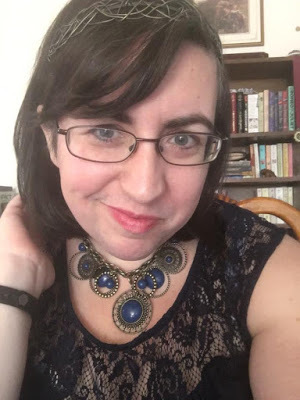 Welcome back to the Teatime Ten, an author interview series! Today we have yours truly chatting about all things romantic from Regency to Shakespeare in
Letters of Love & Deception
and
The Merry Widows of Windsor
!
Welcome back to the Teatime Ten, an author interview series! Today we have yours truly chatting about all things romantic from Regency to Shakespeare in
Letters of Love & Deception
and
The Merry Widows of Windsor
!Oh...and what to do with an elephant you've suddenly been gifted. Which is to say, check out questions #8 & 9 to see queries gleaned from you!
Make sure to comment below to win a free copy of the audiobook for Nachtsturm Castle, narrated by Suzanne T. Fortin!
1) Tell us a little bit about yourself!
I was raised on a boneless chicken farm off the coast of Kansas...wait, no. I'm a theatre director, playwright and actor, as well as a novelist and blogger, living in NYC. For ten years I taught teenagers, and now run my theatre company, TURN TO FLESH PRODUCTIONS which basically develops new Shakespeare plays, but with vibrant roles for women.
2) What are your latest projects about?I guess love is really in the air! Both of my projects this month are about romance - either the loves we gain or the loves we lose.
Letters of Love & Deception is a selection of short stories inspired by Jane Austen's characters, including an epistolary novel between two of the villains in Persuasion, and poking fun at the Pride and Prejudice and Zombies craze from a few years back (read now). There's also a really sweet story about Miss Bates from Emma and her long lost love.
Conversely, The Merry Widows of Windsor, a riff on Shakespeare's Merry Wives, deals with what happens after happily ever after. There's a lot of silliness, of course! Dogberry and Verges make their way into the script from A Comedy of Heirors . But it's also about sorting out how to keep living after loss.
3) What inspired you to write it?Letters of Love & Deception came from my first year out of college, stuck in cubicle-land. There was an on-line forum called The Republic of Pemberley which hosted a board to post paraliterature called Bits of Ivory. Having spent my senior year of college thoroughly immersed in the emotionally disruptive world of Oscar Wilde's Salome, I was eager to spend some time in Jane Austen's civility.
For The Merry Widows of Windsor, the American Shakespeare Center has put out a call for "Shakespeare's New Contemporaries" - that is, looking for plays in conversation with Shakespeare's canon. Since I've spent my life as a working playwright - that is, always writing against a deadline and "to spec" (E.g., We've got fourteen actresses and twenty minutes! Write a play!), I work well with these constraints.
That said, it's fascinating to see the difference between writing Letters in 2000, and writing Widows in 2018. I hadn't had much life experience way back when. I certainly hadn't suffered loss - I hadn't even suffered (romantic) love at that point. So, there's an element of increased satire like Jane Austen in Letters, while Widows is dealing with some pretty personal stuff.
4) What was the hardest part to write?
Endings. Letters was fun to write. I'm a performer at heart, so writing immediately and then putting it up for an audience once a week encouraged me to keep writing. (That's how I finished my first two novels after all!) But I'm like Leonardo da Vinci - I've got all these half-finished novels and plays lying around, and I need someone expecting to read or produce them in order to get myself together and finish the darn thing!
5) What's your favorite part of the writing process?
Probably finishing. Naw, I'm just kidding. (But I'm also pages away from finishing Widows, and you know how I feel about endings.) I mean, my favorite part is when the characters are loud enough that you can just put a single song on repeat, zone out, and follow them around - gasping and laughing and crying (yes, crying) as though you were a reader. Those days are rare, of course. But when they come, they're great.
6) What was your journey to publishing like?
I've written about getting a traditional publisher here - and if I'm being honest, I've been fortunate enough to receive a couple of lucky breaks like that. (Including a super-secret path-eos that'll impact this blog soon - shhhh!) But a lot of getting published, or of getting produced is equal parts:Luck: You just happen to be the person they're looking for at the time you're looking for themDiscipline & Endurance: Keep writing. Then keep writing. Then keep writing.Chutzpah: Submit your stuff. Then send it out again. And again. And when you don't believe in your stuff, and everything's terrible, send it out again.7) Do you have any tips for would-be authors?
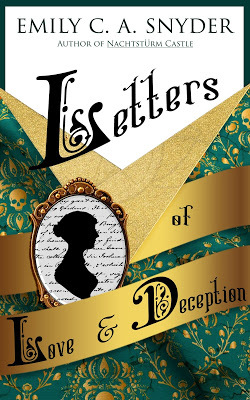 In acting, we want to get the scripts out of our hands as soon as possible. Because once you're memorized and you can get it in your body, then the art really begins.
In acting, we want to get the scripts out of our hands as soon as possible. Because once you're memorized and you can get it in your body, then the art really begins.I think the same holds true for publishing. Get the text out of your hands. Let others read it. Publish it. Send it to agents. Get rejected. Learn from that. Start again.
As a playwright, I've found that this discipline of not being too precious with one's text has made my work not only more vital, but more enjoyable. Right now, we're in rehearsals for a private reading of Widows (shhhh - more information about a public reading coming soon!), and I'm wearing the hat of playwright-actor for the first time. It's such an honor to see how others are interpreting the characters; to hear what they're experiencing from the inside; to just have lines changed and massaged to be better and more specific. And I'm always amazed at the generosity of the cast and crew who are willing to roll with Act IV being entirely rewritten with new soliloquies thrown in, or being patient as they wait for pages...specifically for that darn ending!
But in short, best advice? Courage. Let your work be seen.
#8&9 (The following qustions were gleaned from you on the interwebs!)
How dare you?
I DON'T KNOW! But I think it has a lot to do with Imposter Syndrome, frustration with how women are being written, and the Procrastination Monkey.
You got a lotta nerve!
No, I don't think I do. But thanks for letting me know my acting like I've got nerve is paying off! Acting, thank you!
You’re invited to a party and you don’t know anyone there. You walk in. What do you do first? Do you survey the scene to get a feel for the vibes or do you go up to someone and introduce yourself?
In real life, if I don't know anyone there...I probably didn't go. No, that's not true. But I will almost certainly make my way to the chips and dip and hope that no one continues to notice me as I make like my ancestors and ghost.
If it's a networking event, though, I tend to crank up the charm to 11, waltz in - still go to the chips and dip (because that's where everyone who's also afraid to meet people go) - hold out my hand and start smiling like a mother. (Full disclosure: first time I ever had to do this in Hollywood of all places, I had to give myself a pep talk and pretend to be my far more outgoing brother.)
If I'm going to an event where I don't know anyone, but I'm the keynote speaker, generally people come up to me. And I never get to the chips and dip.
You were going to include a particular character/scene in your book but changed your mind. Why?
Ooooooooooh. This is a good one. Hmmm, well for the super-secret nunnery #MeToo project (see Question 10), I'm debating letting Dogberry and Verges invade here, too. It's super 50-50 which way it will go.
I'd say one of the scenes I'm sorriest to have lost is in my taking-forever-to-write novel, The Sable Valentine. There was this whole subplot where we went to the opera and met this louchy guy (I love writing louchy guys) who was going to be a romantic rival for our heroine. But I don't know that I need him. Although we'll still go to the opera.
I'm also working on finishing up Presumption, a Pride and Prejudice novel, hopefully due out in the fall. I got stalled by trying to add in a storyline for Anne de Bourgh, but I don't think that she needs it.
All my foils get foiled again!
What do you look for in collaborators?
Really, I look for people who "get it." In theatre, this means actors who just "get" my work, either interpreting it as actors or directors, or who know me well enough to needle me to be a better writer. I don't need "yes men" - that's not productive - but I do want people who support me through the process to make the work the best that it can be. Which often means asking questions, challenging, or offering new points of view. But in a loving way.
I mean, it's like love, right? There's a spark. As C. S. Lewis says about friendship, it's meeting someone to whom you can say: "You, too? I thought I was the only one who thought this way!"
I love finding that in others, and then challenging each other to be more than what we thought we were.
Describe your creative process prior to sitting down to write the first draft.
So much TV. So many showers. So much cooking and cleaning and saying yes to parties and talking to old friends and doing pretty much anything not to actually start writing.
I used to think that all this was procrastination, but I don't think so anymore. Because the articles I read, the TV I take in, the quiet times spent doing physical activities, the conversations about life I have with friends and family - this is the stuff I write about. It's like getting all your ingredients together. And in some cases, it's about planting the seeds that will become ingredients further on.
That said, when I usually get a germ of an idea, I'm a talker. For Widows, I've called up my family many times to just chat out loud with them about what the story might be. I don't use a fifth of what we brainstorm, but it gets the water boiling.
Why do you write like you're running out of time?
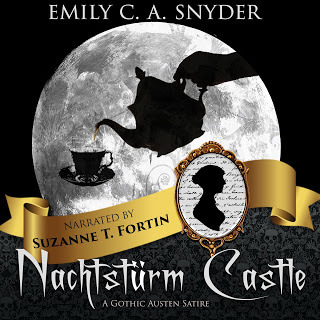
Because...I am.
Honestly, turning 40 this year, and starting to watch my parents and my parents' generation age, it's struck me that (God willing) I only have a good 40-50 years left on this earth, and I'd better make good use of it.
I think I made good use of my first 40, but I mostly interpreted works from others. Mostly Shakespeare. And while that's great training, if I don't write these plays, they will simply never ever ever be written. They won't exist.
So...my literary clock is ticking?
On a scale from One to Pickle, how many oliphaunts are in a dram?
Driving glove, man. C'mon. Everyone knows that.
If you could pick one of your characters to come into real life (a la the musical "City of Angels") and talk with you, who would you pick?
Hmmmm, only one? Shoot. Romantically, I'm inclined to pick the very first swashbuckling brooder I ever wrote, the dashing Poityr vol Rev, because I'm still a twelve year old girl at heart.
But if I wanted wisdom, I'd do better inviting Urdur, the Lord of Mysteries to come into my home. He'd be grumpy and impossible, but he'd be right.
Piggybacking on the above, if you could prevent anyone from ever acting like or sounding like any character you have written, which would you pick and why?
Yikes. Again. Only one? I've written...I have written so many cads. Like, so so many. I mean, I'd rather not have Kian (from the Poityr novel; read here) be alive, because he's super powerful and mass-murdery and manipulative, so there's that.
But I'm also not a fan of my Francis Ford in Merry Widows of Windsor, who's behaving like a controlling, manipulative jerk under the guise of piety and love. And although I know at least one friend who loves my character Padriac from Niamh and the Hermit , I find that guy manipulative and petty and opportunistic, too.
Can I just say: I'd stop all the manipulative people from manipulating? But Kian. Yes. Because of all the genocide.
You've been given an elephant. You cannot sell it or regift it. What to you do with the elephant?
Are you kidding me? Finally! Free transportation in New York City!
And finally...Why does a chicken?
Purple.
10) What's up next creatively for you?
For novels: Letters will be available in audiobook by the summer, and hopefully hardcover, too!
For plays: I'm working on a top secret new play that's inspired by Tartuffe and Measure for Measure in the light of #MeToo, which means that it involves sex, nuns, and convoluted rhymes. Of course.
Over on Patreon: I'm releasing music, stories, and a pretty big writing project over there. So check that out!
For blogs: As mentioned, there's a super secret and exciting set of papers being signed, but let's just say we've got some Pop Feminist articles coming your way soon.
 ABOUT THE AUTHOR:
ABOUT THE AUTHOR: Emily C. A. Snyder has written far too much. And is grateful to do so. She is starring for the first time since third grade in her own play, The Merry Widows of Windsor, and is terrified out of her mind. Well, excited and scared. She will bet you one kiss you didn't get this far in the blog.
Connect with her on Facebook, Instagram, Twitter, Pinterest or YouTube! Become her patron on Patreon. Check out her official website here.
BOOK GIVEAWAY! Leave a comment and be entered to win an audiobook copy of Nachtsturm Castle from the author! The winner will be notified by next Tuesday's Teatime Ten!
CONGRATS to Nicole Stallworth, Caitlin Leyden, and Laisha V for winning last week's give-away, copies of Rosamund Hodges' Bright Smoke, Cold Fire. See the full Teatime Ten interview here.

 Want more Pop Feminism blogs? Become my patron on Patreon today!
Want more Pop Feminism blogs? Become my patron on Patreon today!
Published on February 13, 2018 13:32
February 6, 2018
TEATIME TEN: Rosamund Hodge
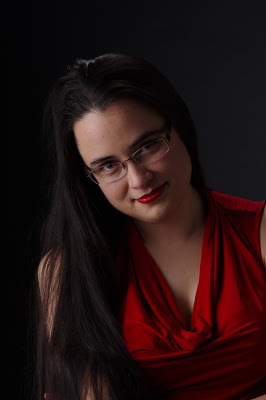 Welcome back to the Teatime Ten, an author interview series! Today we have Rosamund Hodge chatting about her latest novel,
Endless Water, Starless Sky
.
Welcome back to the Teatime Ten, an author interview series! Today we have Rosamund Hodge chatting about her latest novel,
Endless Water, Starless Sky
.Rosamund has generously offered to give away three books, so check out the end of the article for how you can win a copy for yourself!
1) Tell us a little bit about yourself!
I was raised a homeschooler in Los Angeles. I went to college at the University of Dallas and grad school at Oxford (yes, thatOxford). I'm still a little surprised that my life is no longer measured out with coffee spoons and GPAs. I live in Seattle, I raise chickens, and I write novels.
2) What's your latest book about?
I'm in the middle of a duology right now. The first book, Bright Smoke, Cold Fire, was published in 2016; the conclusion, Endless Water, Starless Sky will come out this July. It's a high fantasy retelling of Romeo and Juliet, set in the last city left alive after a zombie apocalypse—a city whose walls are protected by blood-magic, and whose people are riven by blood-feuds.
3) What inspired you to write it?
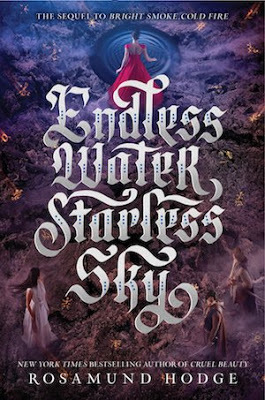 Ballet. (No, really!)
Ballet. (No, really!)I always thought that I hated Romeo and Juliet (even though I couldn't stop thinking about it, which should have been a hint). But when I got a chance at cheap tickets to the ballet Roméo et Juliette, I thought that surely the dancing would be worth the stupid story.
Boy was I wrong. The dancing was beautiful, of course, but the story—you see, the ballet frames it from the perspective of the Friar, so that it's not just a story of teenaged hormones, but of an attempt to end a murderous blood-feud through marriage. The most dramatic moment in the ballet is when Romeo kills Tybalt, because that's when the attempt at peace fails, and tragedy becomes inevitable.
I'm kind of meh about teenaged hormones. But I adore blood-feuds and tragedy. And my experience with the ballet led me to start looking at Romeo and Juliet with new eyes, and to start imagining a new story.
4) What was the hardest part of the book to write?
THE PLOT.
Some people plot naturally. I think they are alien hybrids. For me, the joy of a story is in its characters and its themes and the three to twelve dramatic scenes that come into my head at the start. All the rest is toil and trouble, and the connective tissue—a.k.a. "plot"—is worst of all.
5) What's your favorite part of the writing process?
When I'm drafting, it's editing. When I'm editing, it's drafting. But really, I think my favorite part is brainstorming and outlining the story at its start. That's pure creativity with none of the work.
6) What was your journey to publishing like?
Agonizing yet boring. After I had revised the first draft of Cruel Beauty a few times, I started querying. The process took about eight months and most of my sanity. Finally I signed with an agent, and she told me to revise again. Once we went on submission, HarperCollins made their offer within a couple weeks.
7) Do you have any tips for would-be authors?
Honestly, I feel as if all the really good tips have already been given? What I will say is this: someday, you are going to lose your joy in writing. It will happen, whether it's your first revision for an agent, or your twenty-second for an editor.
But this is the secret: you can find your joy again. It may take time and it may take trouble. It may take a total break from the world of publishing. But if you really love writing, then no matter how hard it gets, you can always find that joy again.
8) You're on a spy mission to save the hero(ine) of the last book you read. Who are you saving and is it worth it?
The last (fiction) book I read was Something Dark and Holy by Emily Duncan, which won't be published until 2019. The heroine, Nadya, is the one person left in her country who can talk to the gods, and I would absolutely consider it worth saving her even though it's kinda ambiguous as to whether her gods are good news or bad.
9) For twenty-four hours, you can live in one of your worlds. Which do you pick and why?
All of my worlds are terrible and uncomfortable and I would never want to live in them.
If I were forced to choose, I would live in the world of Crimson Bound, where at least they have really cool dresses.
10) What's up next creatively for you?
I'm drafting a new novel, and for the first time in my (published) career, it's not a retelling! It's still fantasy, though: about a girl who kills the evil sorcerer controlling her contry and then finds herself haunted by his ghost.
 ABOUT THE AUTHOR:
ABOUT THE AUTHOR: Rosamund Hodge is a graduate of homeschooling, Oxford University, and the Viable Paradise writer’s workshop. She now lives in Seattle and writes stories about fairy tales, myths, and dangerous girls. Her novels include CRUEL BEAUTY and CRIMSON BOUND.
Connect with her on Facebook, Instagram, Twitter, or Tumblr! Check out her official website here.
BOOK GIVEAWAY! Leave a comment and be entered to win an e-copy of Bright Smoke, Cold Fire from the author! The three winners will be notified by next Tuesday's Teatime Ten!
CONGRATS to Mary Preston for winning last week's give-away, a copy of Rebecca Loomis' A Whitewashed Tomb. See the full Teatime Ten interview here.

 Want more blogs supporting women in the arts? Become my patron on Patreon today!
Want more blogs supporting women in the arts? Become my patron on Patreon today!
Published on February 06, 2018 07:00
January 30, 2018
TEATIME TEN: Rebecca Loomis
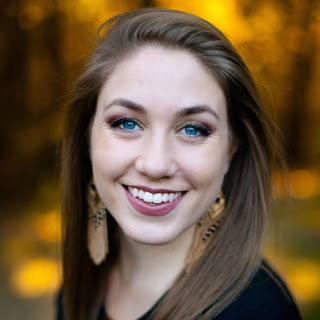 Welcome back to the Teatime Ten, an author interview series! Today we have Rebecca Loomis chatting about her debut novel,
A Whitewashed Tomb
.
Welcome back to the Teatime Ten, an author interview series! Today we have Rebecca Loomis chatting about her debut novel,
A Whitewashed Tomb
. Rebecca has generously offered a book giveaway, so check out the end of the article for how you can win a signed copy for yourself!
1) Tell us a little bit about yourself!
I'm a Catholic artist, photographer, graphic designer, and writer. I grew up in New York, then zig-zagged across the country for college and missionary work. I studied film in California, then mass communications in Kansas; served with Saint Paul's Outreach at Arizona State University, then again at Texas State University. I've visited seven foreign countries and counting, and it's taught me how small I am in this massive world of wondrous marvels. I'm stubborn but soft. A dreamer and a doer. I can't stand being passive, but I hate being busy. At all times, the contents of my purse will include a knife, a koozie, and a rosary. When people ask me what I like to do, I'm stumped, because I simply love life and all it's facets! I believe that beauty can save the world, and I'm determined to play my part in making it a little more lovely with the gifts God has given me.
2) What's your book about?
A Whitewashed Tomb is a dystopian novel (the genre of The Hunger Games, Divergent, and Fahrenheit 451) about a young woman named Tabitha. She lives in a society divided into the classes of "Privileged" and "Provision," the latter of which provides all necessities to the former. Her problem: Tabitha is Privileged. Her mother is dying. And only the Provision have access to the kind of medicine she needs. Tabitha's father promised to obtain this medicine, but has been MIA since he left, three years prior. When Tabitha discovers that her father is a felon at an elite institute for the Provision, she blackmails her way in, making the same promise to her twin that she'll get medicine for their mother. When Tabitha arrives at the institute, she's recruited by Security to assist in finding and capturing him, putting her at an impasse: to save one parent would doom the other. At first, the choice seems obvious. Her father abandoned her and deserves his punishment! But a large part of her still just wants her daddy back. Through her journey, Tabitha learns what it really means to forgive, and is challenged to sacrifice her own ambitions to take a stand for what is right.
3) What inspired you to write it?
Writing requires a general love for people in all their diverse complexity. My inspiration comes from them all: people I've met, people I sleep down the hall from, people I see at airports, and the ways people have impacted my life--for good or for ill. It's hard to pinpoint a single spark that lit the fire for A Whitewashed Tomb. Some of my inspirations for the society and antagonist come from Fahrenheit 451 by Ray Bradbury, and my own personal studies of Margaret Sanger and the New World Order. This first book of the Whitewashed Tomb series doesn't touch too much on these dystopian factors, but there's a lot more creepy totalitarianism and eugenics to come in the sequels!
4) What was the hardest part of the book to write?
The hardest part of writing my book was starting. I planned and outlined for years before I finally wrote the first scene. I never even used the prologue that was the first thing I wrote, but I didn't need to. It didn't matter. What mattered is that I'd started, and in doing so unplugged the cork that was stopping the story from flowing freely out.
5) What surprised you about the writing process?
I was most surprised at how the story kind of wrote itself. I had plans in place that I'd labored over for literal years and had to scratch because my characters would simply not allow it. Some side-characters were never supposed to live past the midpoint, but they demanded to exist. Some characters were supposed to fall in love, and they told me, "Ew! Not happening." Some of my favorite scenes and story elements (i.e. Krikor and the bubble-gum pink squirrel) happened spontaneously mid-sentence.
6) What was your journey to publishing like?
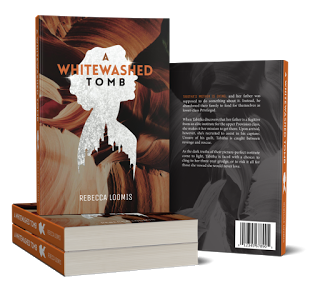 When I finished the first draft of my novel, I cried. When I held the first proof of my book in paperback format, I laughed 'til my face hurt. When I announced to my social media followers that my book was available for purchase, my heart dropped into the pit of my stomach. Oh gosh. People are actually going to read this. It was terrifying.
When I finished the first draft of my novel, I cried. When I held the first proof of my book in paperback format, I laughed 'til my face hurt. When I announced to my social media followers that my book was available for purchase, my heart dropped into the pit of my stomach. Oh gosh. People are actually going to read this. It was terrifying.A Whitewashed Tomb isn't on the big, colorful displays at Barnes&Noble (though that would be amazing!). My dad, Mario Loomis, had recently self-published his novel Essence, Assault on the Mind , through an Amazon company called CreateSpace. I followed his footsteps. Everything was in my control: the design, the marketing, the distribution. I knew it would be a little, unknown book and I probably wouldn't make any profit off it, but it was out there. Someone, somewhere, would get to experience the delightful story that had, until then, been exclusively mine. That's what mattered to me most.
This being my expectation, I was blown away by the positive feedback I got from my readers. People fell in love with Ambrose. People begged me to tell them what happened with Mayra Mae. People wailed at Tabitha's stupid mistakes, the same way I had. Local shops offered to let me host book signings, someone asked for discussion questions to review at their book club, some others gave me five-star reviews, and many people sent me pictures of their excited selves holding their newly-arrived copies of my story. These may have been little, everyday gestures to them, but each one meant the world to me.
In short, I'm still a starving author, but there's nothing like kicking that horrid title "Aspiring Writer" to the curb, and getting to fawn over my own characters with other people who now know them too.
7) Do you have any tips for would-be authors?
I've found that just about every other person I talk to about my book has some story locked away inside them. They say, "Oh, I've always wanted to write a book," or "There's a story I've been thinking about writing for years," and so on. My advice to them would be: JUST DO IT. I spent six years working on A Whitewashed Tomb, but only ten months actually writing the first draft. The hardest step is the first, but if you never make it, you'll always ask "What if?".
On a practical note, I found that setting a daily word-count goal is a huge game-changer. I decided on 500 words per day, and when I incorporated that into my routine, that's when I was finally able to write my story. Not only did it push me to finish, it also released a torrent of creativity that I wasn't previously able to tap into. I think when you force yourself to do something creative despite a lack of inspiration, it trains your brain to be more creative all the time. I didn't always meet 500 words, but when I pushed past the first 50-100, I usually ended up writing closer to triple my goal, and the quality of the work was better.
8) You're stranded on a desert island for a week and can only bring one book, one dessert, and one famous person dead or alive. What's your week like?
Book: Mara, Daughter of the Nile by Eloise Jarvis McGrawDessert: Ice cream (mint chocolate chip, cookie dough, and chocolate peanut butter swirl with hot fudge and whipped cream)Famous person: JesusJesus can multiply fish and make bread fall from the sky, so I'll be able to survive there for a week no problem. He'll make excellent company as I read my favorite Egyptian historical fiction for the tenth (give or take) time, and the ice cream will cool me off after a long day of exploring the untamed nature of our island.
9) For twenty-four hours you're given one superpower. What is it and what do you do with it?
I never actually watched the show Avatar, but I would love to be a water-bender. Water fascinates and simultaneously intimidates me. I would use my superpower to create an air bubble around my head and fulfill my dream of swimming among hundreds of wild stingrays. I'd might power-wash my house... but mostly I'd just play. Playing is good for the soul.
10) What's up next creatively for you?
Next up on the list of things to write is the sequel to A Whitewashed Tomb! I've already got the storyline all worked out, it's just a matter of doing the actual writing and editing. This is the fun part, and I can't wait to share it with my readers.
 ABOUT THE AUTHOR: Rebecca Loomis is a photographer and graphic designer from the New York Hudson Valley. During college, she studied under screenwriter Christopher Riley, who is considered “The most authoritative figure for the official screenplay format of Hollywood,” according to IMDb. Switching gears from entertainment media to mass communications, Rebecca graduated summa cum laude from Benedictine College. She then spent three years doing stateside missionary work, counseling college students for the nonprofit Saint Paul’s Outreach, after which she dabbled in marketing at BBG&G Advertising. Rebecca has won multiple awards for her poetry, published articles in various media outlets, and teaches online classes through Skillshare.com.
ABOUT THE AUTHOR: Rebecca Loomis is a photographer and graphic designer from the New York Hudson Valley. During college, she studied under screenwriter Christopher Riley, who is considered “The most authoritative figure for the official screenplay format of Hollywood,” according to IMDb. Switching gears from entertainment media to mass communications, Rebecca graduated summa cum laude from Benedictine College. She then spent three years doing stateside missionary work, counseling college students for the nonprofit Saint Paul’s Outreach, after which she dabbled in marketing at BBG&G Advertising. Rebecca has won multiple awards for her poetry, published articles in various media outlets, and teaches online classes through Skillshare.com.Connect with her on Facebook, Instagram, Twitter, Pinterest or Patreon! Check out her official website here. Follow A Whitewashed Tomb here.
BOOK GIVEAWAY! Leave a comment and be entered to win one signed paperback from the author! The winner will be notified by next Tuesday's Teatime Ten!

 Want more blogs supporting women in the arts? Become my patron on Patreon today!
Want more blogs supporting women in the arts? Become my patron on Patreon today!
Published on January 30, 2018 08:19



